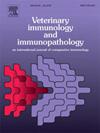Effects of Saccharomyces cerevisiae fermentation-derived postbiotics supplementation in sows and piglets' diet on intestinal morphology, and intestinal barrier function in weaned pigs in an intensive pig production system
IF 1.4
3区 农林科学
Q4 IMMUNOLOGY
引用次数: 0
Abstract
This study evaluates the effects of Saccharomyces cerevisiae fermentation-derived postbiotics (SCFP) supplementation on diarrhea incidence, small intestinal morphology, and expression of tight junction genes in piglets. The study compared three groups: a control group (CON), which received a standard basal diet; a standard basal control diet containing 1.0 kg/mT of Beta-glucan 50 % (BG); and a standard basal control diet containing 2.0 kg/mT of SCFP (Diamond V XPC). The experimental design involved feeding the diets to the sows from the day when they were inseminated until their piglets were weaned and to piglets from birth to weaning. Diarrhea incidence was monitored, intestinal morphology was assessed, and gene expression of tight junction proteins (Claudin-1, Claudin-2, Occludin, and ZO-1) and inflammatory cytokines (IL-1β) was analyzed using qPCR. Results revealed that SCFP supplementation significantly reduced diarrhea incidence and upregulated the expression of tight junction proteins Claudin-1 (1.61-fold) and Occludin (1.90-fold) compared to CON. These improvements were not associated with changes in intestinal morphology. BG supplementation showed intermediate effects on tight junction gene expression but did not differ significantly from CON. These findings highlight the potential of SCFP as a dietary supplement to enhance gastrointestinal health in piglets by strengthening the intestinal epithelial barrier and reducing pathogen translocation. The study underscores the efficacy of SCFP in improving gut health without altering intestinal structure, offering an effective approach to manage pre-weaning diarrhea. Future studies are needed to explore the long-term impact of SCFP on growth performance and immunity.
在集约化猪生产系统中,母猪和仔猪饲粮中添加酿酒酵母发酵后生物制剂对断奶仔猪肠道形态和肠道屏障功能的影响
本研究评价了添加酿酒酵母发酵后生物制剂(SCFP)对仔猪腹泻发生率、小肠形态和紧密连接基因表达的影响。该研究比较了三组:对照组(CON),接受标准的基础饮食;标准基础对照日粮,含有1.0 kg/mT的β -葡聚糖50% % (BG);标准基础对照饲粮中添加2.0 kg/mT的SCFP (Diamond V XPC)。试验设计包括从母猪授精之日起至仔猪断奶,以及仔猪从出生到断奶。监测腹泻发生率,评估肠道形态,并采用qPCR分析紧密连接蛋白(Claudin-1、Claudin-2、Occludin和ZO-1)和炎症因子(IL-1β)的基因表达。结果显示,与对照组相比,添加SCFP显著降低了腹泻发生率,上调了紧密连接蛋白Claudin-1(1.61倍)和Occludin(1.90倍)的表达,这些改善与肠道形态的变化无关。添加BG对紧密连接基因表达有中间影响,但与con没有显著差异。这些发现表明,SCFP作为一种饲粮添加剂,有可能通过增强肠上皮屏障和减少病原体易位来改善仔猪的胃肠道健康。该研究强调了SCFP在不改变肠道结构的情况下改善肠道健康的功效,为治疗断奶前腹泻提供了一种有效的方法。需要进一步的研究来探索SCFP对生长性能和免疫的长期影响。
本文章由计算机程序翻译,如有差异,请以英文原文为准。
求助全文
约1分钟内获得全文
求助全文
来源期刊
CiteScore
3.40
自引率
5.60%
发文量
79
审稿时长
70 days
期刊介绍:
The journal reports basic, comparative and clinical immunology as they pertain to the animal species designated here: livestock, poultry, and fish species that are major food animals and companion animals such as cats, dogs, horses and camels, and wildlife species that act as reservoirs for food, companion or human infectious diseases, or as models for human disease.
Rodent models of infectious diseases that are of importance in the animal species indicated above,when the disease requires a level of containment that is not readily available for larger animal experimentation (ABSL3), will be considered. Papers on rabbits, lizards, guinea pigs, badgers, armadillos, elephants, antelope, and buffalo will be reviewed if the research advances our fundamental understanding of immunology, or if they act as a reservoir of infectious disease for the primary animal species designated above, or for humans. Manuscripts employing other species will be reviewed if justified as fitting into the categories above.
The following topics are appropriate: biology of cells and mechanisms of the immune system, immunochemistry, immunodeficiencies, immunodiagnosis, immunogenetics, immunopathology, immunology of infectious disease and tumors, immunoprophylaxis including vaccine development and delivery, immunological aspects of pregnancy including passive immunity, autoimmuity, neuroimmunology, and transplanatation immunology. Manuscripts that describe new genes and development of tools such as monoclonal antibodies are also of interest when part of a larger biological study. Studies employing extracts or constituents (plant extracts, feed additives or microbiome) must be sufficiently defined to be reproduced in other laboratories and also provide evidence for possible mechanisms and not simply show an effect on the immune system.

 求助内容:
求助内容: 应助结果提醒方式:
应助结果提醒方式:


